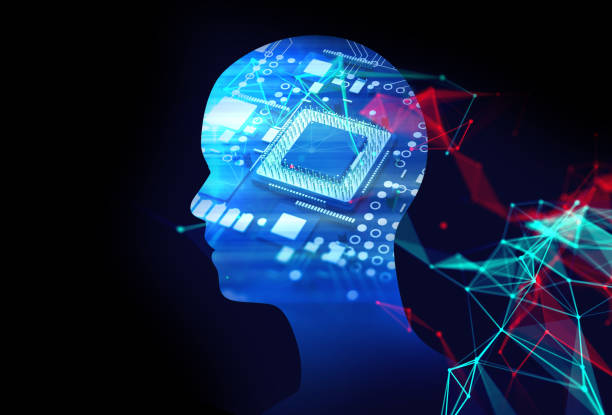What is Artificial Intelligence? Definitions and Basic Concepts

Artificial Intelligence or #AI (Artificial Intelligence) in short, is a branch of computer science that deals with building machines that are capable of performing tasks that usually require human intelligence.
These tasks include learning, reasoning, problem-solving, understanding natural language, and recognizing patterns.
In fact, the goal of artificial intelligence is to simulate human intelligence in machines and computer systems.
There are various definitions for artificial intelligence.
A simple definition is that artificial intelligence is the ability of a computer system to perform tasks that typically require human intelligence.
This definition includes a wide range of activities, from simple computer games to complex facial recognition systems and self-driving cars.
From another perspective, artificial intelligence can be divided into two general categories: Narrow AI and General AI.
Narrow AI is designed to perform a specific task and performs well in that area.
For example, a facial recognition program or a movie recommendation system.
In contrast, General AI is a type of artificial intelligence that has the ability to understand, learn, and perform anything that a human can do.
Achieving General AI is still a long-term goal in this field.
Systems based on artificial intelligence are rapidly advancing and have the potential to reshape the world.
Are you tired of your company’s website not being seen as it should be, and losing potential customers? Solve this problem forever with professional and effective website design by Rasaweb!
✅ Increase brand credibility and build customer trust
✅ Attract targeted sales leads
⚡ Contact us now for a free consultation!
History of Artificial Intelligence from Beginning to Today

The history of artificial intelligence dates back to the mid-twentieth century.
In 1956, a conference was held at Dartmouth College that is recognized as the official starting point of this field.
At this conference, scientists such as John McCarthy, Marvin Minsky, and Allen Newell gathered to explore the possibility of building intelligent machines.
The early decades of artificial intelligence were filled with great optimism.
Researchers believed that they could soon build machines that could mimic human intelligence.
However, progress was slower than expected, and in the 1970s, due to budget cuts and hardware limitations, a period of stagnation began in this field, known as the “AI winter.”
In the 1980s and 1990s, with the development of new algorithms and the increase in computer processing power, artificial intelligence was revived.
Expert Systems, which simulated the knowledge of human experts in a specific field, gained great popularity during this period.
However, these systems also had limitations and could not completely replace human experts.
In the twenty-first century, with the emergence of Machine Learning and especially Deep Learning, artificial intelligence has made significant progress.
Machine learning algorithms allow computers to learn from data and perform various tasks without the need for explicit programming.
These advances have led to the development of powerful artificial intelligence systems that are used in various fields such as facial recognition, language translation, autonomous driving, and medicine.
Now, artificial intelligence is rapidly penetrating our daily lives and is expected to play an even more important role in the future.
Types of Artificial Intelligence Methods and Techniques

Artificial Intelligence encompasses a wide range of methods and techniques, each designed to solve specific problems.
Some of the most important of these methods include:
- Machine Learning Machine learning allows computers to learn from data and identify and predict patterns without the need for explicit programming.
Machine learning itself is divided into various sub-branches such as Supervised Learning, Unsupervised Learning, and Reinforcement Learning. - Deep Learning Deep learning is a subset of machine learning that uses Deep Neural Networks to learn from data.
Deep neural networks consist of a large number of layers that allow computers to identify complex patterns in data.
Deep learning has performed very well in areas such as image recognition, natural language processing, and speech recognition. - Natural Language Processing (NLP) Natural language processing allows computers to understand and process human language.
This includes tasks such as language translation, text summarization, answering questions, and generating text. - Expert Systems Expert systems are computer systems that simulate the knowledge and reasoning of human experts in a specific field.
These systems can be used to solve complex problems and provide advice to users. - Robotics Robotics is a branch of engineering that deals with the design, construction, and operation of robots.
Robots can be used to perform tasks that are dangerous, repetitive, or impossible for humans.
Robots often use artificial intelligence algorithms to perform their tasks.
Choosing the appropriate artificial intelligence method depends on the type of problem and the available data.
In many cases, a combination of different methods is used to solve a complex problem.
Applications of Artificial Intelligence in Various Industries

Artificial Intelligence is rapidly penetrating various industries and has found diverse applications in various fields.
Below are some of these applications:
- Medicine Artificial intelligence plays an important role in disease diagnosis, drug development, personalized treatments, and improved patient care.
- Finance Artificial intelligence is used in fraud detection, risk management, market forecasting, and providing financial advisory services.
- Manufacturing Artificial intelligence is used in the automation of production lines, quality control, predicting equipment failure, and optimizing production processes.
- Transportation Artificial intelligence plays a role in the development of self-driving cars, traffic management, route optimization, and improved transportation safety.
- Retail Artificial intelligence is used in personalizing the shopping experience, predicting demand, managing inventory, and providing customer service.
- Education Artificial intelligence is used in personalizing education, providing automated feedback, identifying learning needs, and creating interactive learning environments.
- Security Artificial intelligence plays an important role in detecting security threats, identifying suspicious activities, and preventing cyber crimes.
These are just a few examples of the applications of artificial intelligence in various industries.
With the advancement of technology, it is expected that the applications of artificial intelligence will become more widespread and diverse in the future.
Artificial intelligence will dramatically change our world.
Does your company’s website perform as befits your brand? In today’s competitive world, your website is your most important online tool. Rasaweb, a specialist in designing professional corporate websites, helps you to:
✅ Gain credibility and customer trust
✅ Convert website visitors into customers
⚡ Get a free consultation to get started!
Advantages and Disadvantages of Artificial Intelligence: A Comprehensive Review

Artificial Intelligence, like any other technology, has its own specific advantages and disadvantages.
Understanding these advantages and disadvantages is essential for the responsible and informed use of this technology.
Advantages:
- Increased Productivity Artificial intelligence can increase productivity by automating repetitive and tedious tasks, allowing humans to focus on more creative and complex tasks.
- Improved Accuracy Artificial intelligence systems can process data with much higher accuracy than humans and reduce errors.
- Reduced Costs Artificial intelligence can reduce costs by automating processes and reducing the need for human labor.
- Better Decision-Making Artificial intelligence can help make better and more informed decisions by analyzing large and complex data.
- Solving Complex Problems Artificial intelligence can be used to solve complex problems that are difficult or impossible for humans to solve.
Disadvantages:
- High Cost Developing and implementing artificial intelligence systems can be very costly.
- Lack of Expertise The shortage of skilled experts in the field of artificial intelligence is one of the main challenges in this area.
- Ethical Issues Artificial intelligence can create new ethical issues, such as algorithmic bias, privacy, and accountability.
- Job Losses Automation resulting from artificial intelligence can lead to job losses in some industries.
- Dependence Over-reliance on artificial intelligence systems can lead to a decrease in human skills and vulnerability to errors.
Despite the disadvantages, the potential of Artificial Intelligence to improve human lives is enormous.
With proper management and attention to ethical issues, the benefits of artificial intelligence can be realized and its disadvantages minimized.
Artificial intelligence has the ability to create major transformations in human societies.
Ethical and Social Challenges of Artificial Intelligence

Artificial Intelligence, in addition to its many advantages, also poses important ethical and social challenges.
These challenges must be taken seriously to ensure the responsible and ethical use of this technology.
Some of the most important ethical and social challenges of artificial intelligence include:
- Algorithmic Bias Artificial intelligence algorithms can make discriminatory decisions based on biased training data.
This discrimination can occur in various fields such as hiring, lending, and criminal justice. - Privacy Artificial intelligence systems often require a large amount of personal data.
The collection, storage, and use of this data can create privacy issues. - Accountability If an artificial intelligence system makes a mistake or causes damage, it is difficult to determine accountability.
Who is responsible? The developer, the user, or the artificial intelligence system itself? - Security Artificial intelligence systems can be targeted by cyberattacks and misused.
- Impact on Employment Automation resulting from artificial intelligence can lead to job losses in some industries and increase economic inequality.
To address these challenges, there is a need to develop appropriate laws and regulations, develop fair and reliable algorithms, and provide public education and awareness about the ethical issues of artificial intelligence.
Also, the social impacts of artificial intelligence should be considered and plans made to mitigate its negative effects.
The Future of Artificial Intelligence and Possible Predictions

The future of Artificial Intelligence is very bright and full of potential.
With the ever-increasing advancement of technology, artificial intelligence is expected to play an even more important role in our lives in the coming years and create major transformations in various industries.
Some possible predictions for the future of artificial intelligence include:
- Expanding Applications Artificial intelligence will be used in new fields such as energy, agriculture, the environment, and space.
- Development of Strong Artificial Intelligence Achieving strong artificial intelligence (AGI) that has the ability to understand, learn, and perform anything that a human can do is a long-term goal of many researchers.
- Integration of Artificial Intelligence with Other Technologies Artificial intelligence will be integrated with other technologies such as the Internet of Things (IoT), blockchain, and virtual reality (VR), creating new possibilities.
- Greater Personalization Artificial intelligence systems will be able to better understand the individual needs of users and provide more personalized services and products.
- Increased Autonomy Artificial intelligence systems will become more autonomous and will be able to make complex decisions without human intervention.
Despite these predictions, the future of Artificial Intelligence is uncertain and there are many challenges ahead.
However, by investing in research and development and paying attention to ethical and social issues, the potential of artificial intelligence can be harnessed to improve human lives.
Artificial intelligence is a powerful tool that can shape our future.
How Does Artificial Intelligence Learn? Introducing Key Algorithms

Artificial Intelligence uses various algorithms to learn from data.
These algorithms allow computers to identify patterns, make predictions, and make decisions.
Here we introduce some key machine learning algorithms:
- Linear Regression This algorithm is used to predict a continuous variable based on one or more other variables.
For example, linear regression can be used to predict the price of a house based on its area. - Logistic Regression This algorithm is used to predict a categorical (binary) variable.
For example, logistic regression can be used to predict whether a customer will repay a loan or not. - Decision Tree This algorithm is a tree structure used for decision-making.
Each node in the tree represents a feature and each branch represents a value of that feature.
Decision trees can be used to classify data and make predictions. - Support Vector Machine (SVM) This algorithm is used to classify data.
SVM tries to find the best boundary between two classes of data. - Neural Networks Neural networks are computational models inspired by the structure of the human brain.
These networks consist of a large number of nodes (neurons) that are connected in layers.
Neural networks have performed very well in areas such as image recognition, natural language processing, and speech recognition. - Clustering Algorithms These algorithms are used to group similar data into a cluster.
For example, clustering algorithms can be used to segment customers based on their purchasing behavior.
Choosing the appropriate algorithm depends on the type of problem and the available data.
In many cases, a combination of different algorithms is used to solve a complex problem.
Are you tired of missing business opportunities due to not having a professional company website? Don’t worry anymore! With Rasaweb’s corporate website design services:
✅ Your brand’s credibility and professionalism increase.
✅ You attract more customers and sales leads.
⚡ Get a free consultation to get started now!
Tools and Platforms for Artificial Intelligence Development

Developing Artificial Intelligence requires the use of appropriate tools and platforms.
These tools and platforms help developers design, train, and implement artificial intelligence algorithms.
Here we introduce some of the most popular tools and platforms for artificial intelligence development:
- TensorFlow is an open-source machine learning library developed by Google.
TensorFlow is very flexible and can be used to develop a wide range of artificial intelligence applications. - PyTorch is an open-source machine learning library developed by Facebook.
PyTorch is very popular among researchers and developers due to its simplicity and ease of use. - Keras is an application programming interface (API) that runs on TensorFlow, Theano, and CNTK.
Keras helps developers quickly and easily create machine learning models. - Scikit-learn is a Python library that includes various machine learning algorithms.
Scikit-learn is suitable for small and medium-sized machine learning projects. - NLTK (Natural Language Toolkit) is a Python library that is used for natural language processing.
NLTK includes various tools and data that help developers create natural language processing applications. - OpenCV (Open Source Computer Vision Library) is an open-source library that includes various machine vision algorithms.
OpenCV is used to develop machine vision applications such as facial recognition, object detection, and motion tracking. - Google Cloud AI Platform is a cloud platform that allows developers to train and implement machine learning models.
- Amazon SageMaker is a cloud platform that allows developers to train, implement, and manage machine learning models.
Choosing the appropriate tool and platform depends on the type of project and the needs of the developer.
Using these tools and platforms, artificial intelligence applications can be developed quickly and easily.
The Future of AI Jobs and Required Skills

With the increasing expansion of the applications of Artificial Intelligence, the job market for experts in this field is also expanding.
The future of artificial intelligence jobs is very bright and there are many job opportunities in various fields.
Some of the jobs related to artificial intelligence include:
- Data Scientist Data scientists are responsible for collecting, analyzing, and interpreting data.
They use machine learning algorithms to solve business problems. - Machine Learning Engineer Machine learning engineers are responsible for designing, developing, and implementing machine learning models.
They must have in-depth knowledge of machine learning algorithms and programming. - AI Engineer AI Engineers are responsible for designing and developing AI systems.
They must have extensive knowledge of AI, Machine Learning, Natural Language Processing and Computer Vision. - AI Researcher AI Researchers research and develop new AI algorithms.
- Business Intelligence Analyst Business Intelligence Analysts use data to help organizations make better decisions.
To succeed in these jobs, the following skills are required:
- Knowledge of Mathematics and Statistics
- Programming Skills (especially Python)
- Knowledge of Machine Learning Algorithms
- Problem-Solving Skills
- Communication Skills
- Specialized Knowledge in a Specific Field (such as medicine, finance, or manufacturing)
By acquiring these skills, one can succeed in the thriving artificial intelligence job market and contribute to the development of this technology.
Artificial intelligence provides many opportunities for talented and interested individuals.
Frequently Asked Questions
| Question | Answer |
|---|---|
| What is the definition of Hush Masnui (Artificial Intelligence)? | It is a field in computer science that aims to create intelligent machines that can think, learn, solve problems, and make decisions like humans. |
| Mention some common AI applications. | Includes self-driving cars, voice assistants (such as Siri and Alexa), recommendation systems (such as Netflix and Amazon), face recognition, and medical diagnosis. |
| What is the difference between Narrow Artificial Intelligence (ANI) and General Artificial Intelligence (AGI)? | Narrow artificial intelligence is specialized in one specific task, while general artificial intelligence possesses human intellectual ability to perform any cognitive task. |
| What is Machine Learning and its relationship to Artificial Intelligence? | Machine learning is a branch of artificial intelligence that focuses on developing algorithms that allow systems to learn from data without explicit programming. |
| What are Artificial Neural Networks? | They are computational models inspired by the structure and function of the human brain, and used in deep learning to process data and discover complex patterns. |
| Mention some ethical challenges related to artificial intelligence. | Includes privacy issues, bias in data and algorithms, job losses, and responsibility in the event of errors or unfair decisions. |
| What is Natural Language Processing – NLP? | It is a branch of artificial intelligence that focuses on enabling computers to understand, interpret, and generate human language in a useful and interactive way. |
| How can artificial intelligence affect the labor market? | It can lead to the automation of some routine tasks, which requires retraining workers and creating new jobs in the areas of design, development, and maintenance of artificial intelligence systems. |
| What is Computer Vision? | It is a field in artificial intelligence that enables computers to “see” and understand and interpret images and videos in the same way that humans do, enabling them to recognize objects and faces. |
| What is the importance of data in the development of artificial intelligence systems? | Data is the fuel that feeds artificial intelligence systems, especially in machine learning. The quality and quantity of data greatly affect the accuracy and performance of models and their ability to learn and make correct decisions. |
And other services of Rasa Web Advertising Agency in the field of advertising
Smart Marketing Automation: Professional optimization to increase click-through rate using attractive user interface design.
Smart Marketplace: An effective tool to increase sales by using real data.
Smart Reportage: An innovative platform to improve customer behavior analysis with accurate audience targeting.
Smart Sales Automation: Transform online growth with intelligent data analysis.
Smart Brand Identity: An effective tool to attract customers through a search engine optimization-based content strategy.
And over a hundred other services in the field of internet advertising, advertising consulting, and organizational solutions
Internet Advertising | Advertising Strategy | Advertising Reporting
Resources
What is Artificial Intelligence?
,Artificial Intelligence at IBM
,Artificial Intelligence Research at Microsoft
,Google Machine Learning Crash Course
? To elevate your business’s position in the digital world and reach the pinnacle of success, Rasaweb Digital Marketing Agency offers comprehensive and effective solutions. From responsive website design to search engine optimization, get seen professionally with us.
📍 Tehran, Mirdamad Street, next to the Central Bank, South Kazerun Alley, Ramin Alley No. 6
“`



